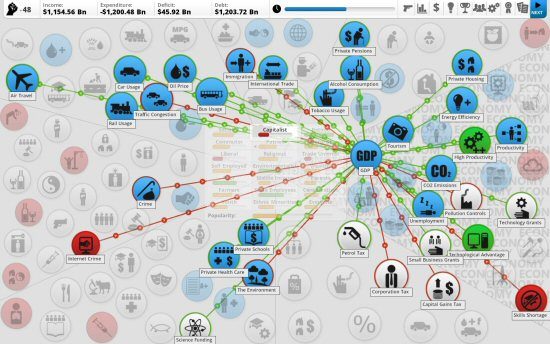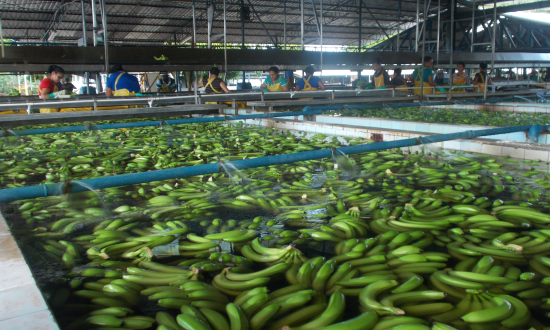So recently I’ve been -rebalancing Democracy 3, my political strategy game for the PC. It looks like I released that game in October 2013, so not quite three years ago. Why would I be balancing it now? First of all, some context and the results so far of my re-balance. the game is an indie ‘hit’ by the standards of solo-developer-owner, having sold (according to steam spy) 485,000 copies. Its currently $25. if you guessed, you’d probably guess that the developer earned $3million ish from the game. Lets say $2,500k profit, which is very nice. Before we go further into strategy, numbers, and the ‘resource curse dilemma’, lets look at what I did.
Part 1: The changes:
Essentially the game was too easy, and a lot of its content remained unseen, untriggered. Some anon gameplay stats showed me that 86% of elections resulted in victory. Thats an easy game. And at election victory, only 1% had the ‘vigilante mobs’ problem, with 12% having it when they lost. There are many other situations, but a lot of them were just not being encountered enough.

So I did some re-balancing, tested it on beta players, then rolled it out, and collected some initial data. The data needs a few days to bed in and to eliminate the bias from beta-opt in players (whom I assume are more hardcore). Anyway,. initial results show that…
Percentage of election victories dropped 8.39% to 79.3%
Average debt level on victory is now up 22.59%
Percentage of games where poverty has been eliminated at election has dropped 10%.
All of these are deliberate. My results in some areas were not so good, maybe even contrary to my plans. For example, the blackmarket situation has gone DOWN, the OrganisedCrime has gone DOWN, the only negative event which is now more likely at elections is TaxEvasion. Technological Advantage has dropped 9% and high productivity dropped 10%, both of which I consider good news in terms of re-balancing the game. So TL;DR: Its moved in the right direction, but not enough. I may have to do another patch.
So part 2: Why fucking bother?
Lets look again at that not official guess of a profit of $2.5 million. Thats fucking cool, but more interestingly, that means if I was to boost sales by 1%, thats worth $25,000 in profit. Thats fucking amazing. Thats more profit than a lot of indie games will make in their lifetime. Holy crap. So if I can spend a week collecting data and analysing, a week re-balancing, a week observing beta, and a week deploying the update (4 lazy weeks), and it makes ONE PERCENT increase in sales, thats $25k / month or $300k a year.

In practice thats bollocks. Will my change make the game 1% better? I suspect it will make it roughly 3% better, but this will only apply to people who come to the game now. A lot of people will have heard of it and discounted it, its only really going to apply to people hearing 3% better reviews from recent players. Say 90% of the games potential audience already have bought or rejected it, then that means there is $250k of potential sales out there, and my 3% boost will be worth $7,500. Of course, thats still a bloody good month. Also, there is the issue of what that 3% boost in game ‘quality’ does. I am assuming a linear distribution of current satisfaction among potential buyers, but what if its skewed with 90% of the potential buyers evaluating the game between 97% and 100% of the quality required to prompt a sale? In that case, a 3% quality boost results in 90% sales increase. Buying a game is a pretty binary decision. TL:DR: Its probably a very good use of my time, but might not be.
so Part 3: How could this possibly be bad.
This is something people occasionally called the resource curse. Country A has fuck-all. Country-B has bananas. Country B just throws the bananas into a ship and exports them everywhere. Job done. Country A is fucked, and cannot afford bananas unless it comes up with something worth trading for bananas, so it invents ipads, and swaps them for bananas. Country B, once a happy smug banana-owning paradise is kinda fucked, because it turns out ipads are worth more, and they never set up the ipad factory because they were eating bananas all day.

I typed that last paragraph purely because I like the idea that my old economics professors are yelling at the screen in agony at my gross simplification.
Anyway, having a big success can be a huge curse. If Democracy 3 makes me enough money that I can keep tweaking it by 1% in order to earn a decent living, why ever take a risk on making something new. This is a problem a lot of companies face. Microsoft are cursed by windows. They cant create a new O/S or office suite from scratch, it makes no economic sense, because windows & office are such cash cows. Its not so much a sunk-costs issue, but a sunk-profits issue. This is a real issue for a lot of developers and entertainers in general. A new series of the big bang theory, however desperately played-out, unfunny and now repeating itself like crazy, is so profitable it doesn’t make sense for the actors or writers to create anything that might potentially be better. he same is true of all fads. Why bother making an interesting new movie when you can dig up some crappy superhero from obscurity and monetize that?

I know this may read as ‘woe is me!, my game sells too well’, but forget finances and think about creativity for a minute. The aim of game development is to make cool stuff, and enjoy doing it. Anything that lures you away from that might be profitable, but is it really the right thing to be doing?
(FWIW, I am working on other stuff, I did months and months of work on a potential new game that I will return to next year, plus I have a new expansion I’m working on).